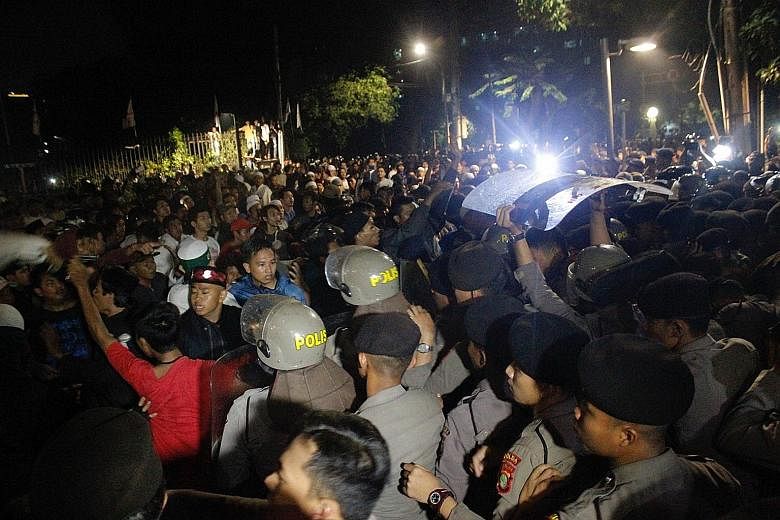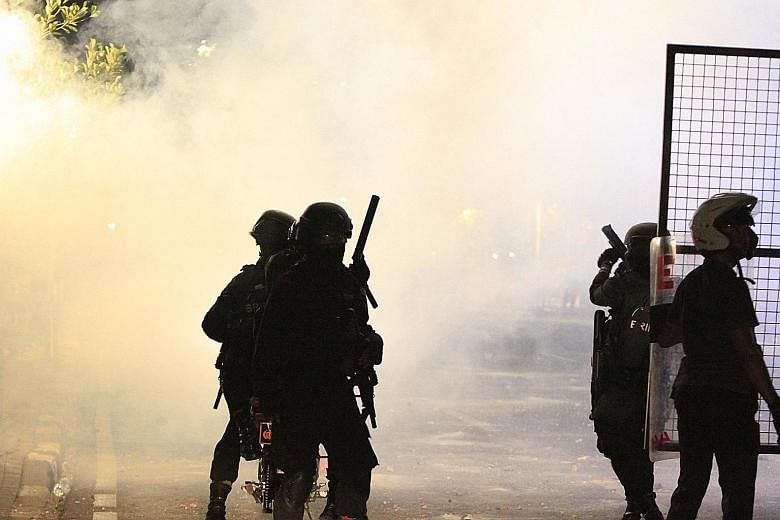A resurgence of anti-communist sentiments in Indonesia has stoked fears that sinister forces behind religion-and race-based attacks in domestic politics recently are moving to play the commie card against their rivals in upcoming elections.
These include the propagation of rumours and fake news that a revival of the long-defunct Communist Party of Indonesia (PKI) is not only imminent, but secretly backed by reformist leaders or groups.
President Joko Widodo, popularly known as Jokowi, has been a prime target of such smear campaigns, which observers say can be traced back to Cold War-era McCarthyism.
Despite the lack of any evidence, the President, who is due to run for re-election in 2019, continues to be accused of being pro-communist.
Professor Leo Suryadinata, visiting senior fellow at ISEAS - Yusof Ishak Institute, said: "I see this as a continuation of the struggle between the entrenched interest groups and the reformists." He describes entrenched interests groups as any political force that opposes the current administration, remnants of former president Suharto's New Order regime or Islamists.
"Apart from Sara, the PKI issue has also been used by entrenched interest groups to undermine the reformists, and eventually to defeat Jokowi, which is their final objective," he said. Sara is the Indonesian acronym for ethnicity, religion, race and class - issues that plagued the last Jakarta election, which the incumbent Basuki Tjahaja Purnama, who is Chinese and Christian, lost to Muslim rivals from the opposition.
-
1965-66 communist purge
Any public hostility and deep suspicion towards Indonesians with the slightest of historical ties to communism often hark back to the Sept 30 Movement in 1965.
Named after the date it was formed and known in Indonesia as Gerakan 30 September (G30S), the group kidnapped and executed six generals and a young lieutenant - who was mistaken by his captors as their seventh target - during a failed coup against President Sukarno.
The Communist Party of Indonesia (PKI) was blamed for the murders, which led to the massacre of many of PKI members and their sympathisers by Indonesian troops and nationalists from Muslim groups.
The killings spearheaded by the army, which was then controlled by Mr Suharto, were never documented, but some have estimated that up to two million people with links to the PKI were wiped out between 1965 and 1966.
At the time, Indonesia had the largest non-ruling communist party in the world.
Mr Suharto later took power and ruled Indonesia for more than 30 years, during which the communist purge was presented as a necessary evil to quell the threat of communism.
This weekend will mark the 52nd anniversary of the massacre, regarded as one of the darkest periods in Indonesia's post-independence history, which many Indonesians have yet to come to terms with.
Human Rights Watch deputy director for Asia Phelim Kine noted that for decades, public discussion of the massacre was banned, but such forums have increased in recent years.
In April last year, the government sponsored a symposium for the airing of accounts from survivors and victims' family members.
But efforts to investigate alleged mass grave sites compiled by victims' advocacy groups have yet to materialise.
The latest "Red Scare" came to bear two weeks ago during a street clash between the police and a mob protesting a suspected gathering of the PKI at the Indonesian Legal Aid Foundation building in Jakarta.
The foundation was planning to hold two closed-door forums on the 1965-1966 communist purge in Indonesia when about 2,000 protesters turned up and threatened to overrun its premises on the night of Sept 17.
Police later arrived and dispersed the crowd with tear gas when it was on the brink of turning violent.
Although the PKI was disbanded in 1966, Islamic nationalists in Indonesia continue to carry a strong sense of paranoia and suspicion towards communism.
Later this week, Muslim conservative groups are set to follow up on the protest at the Indonesian Legal Aid Foundation with a rally outside Parliament after Friday prayers to "block the resurrection of the PKI".
Organisers have called on "alumni 212" or people who attended the Dec 2 protest last year against Basuki to return for the upcoming rally.
Among the leaders expected to attend are Islamic Defenders Front spokesman Slamet Maarif and National Mandate Party chairman Amien Rais, who is known for his anti-communist rants.
Author and political expert Hermawan Sulistyo told Tempo news that these incidents prove that communism remains an "effective political instrument" to rouse a mob.
That is why the Indonesian military's plan this week to hold mass screenings of a Suharto-era propaganda film, Pengkhianatan G30S/PKI, which translates to Treachery Of The Sept 30 Movement By The PKI, has attracted controversy, said Mr Hermawan.
The film tells the story of how communist elements, who called themselves the Sept 30 Movement, kidnapped and executed six generals and a young lieutenant during an abortive coup against then President Sukarno.
The murders that occurred between Sept 30, 1965, and Oct 1, 1965, were blamed on the communists, but it also led to retaliatory killings of possibly up to two million people linked to the PKI, by the military and various Muslim groups.
There are now several differing versions of that dark period in Indonesia's history, which still haunts many Indonesians today.
Other films offering an alternate view of the massacre, such as American film-maker Joshua Oppenheimer's Act Of Killing, which focuses on the recollections of the "death squads", have also been made and screened regularly.
In his remarks after news broke that Indonesian military chief Gatot Nurmantyo had ordered the mass screening of the 1984 film, Mr Joko suggested that a "reboot" of it should be made for today's youth.
"Watching historical movies is important," said the President.
"But the film should be remade so that the younger generation could easily follow it... to let them understand the dangers of communism, as well as to let them know about the PKI."


